Vegan and Vegetarian Foods for Hiking and Camping
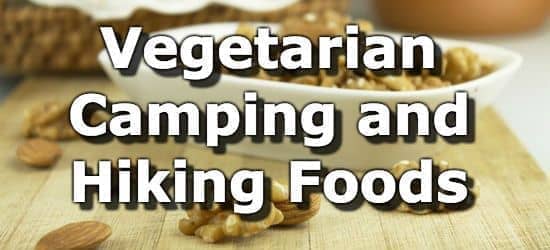
Campers and hikers need foods that are healthy, lightweight, do not spoil, and do not cost too much.
The foods should also provide healthy carbs, protein, fats, and electrolytes to make up for a long day of hiking.
Good vegetarian camping foods include dried foods, nuts, and canned foods. Eating fresh fruits and vegetables when possible is also good, but not practical for longer trips.
The list below gives suggestions for healthy and inexpensive hiking and camping foods for vegans and vegetarians.
Table of Contents
Vegetarian Camping Foods List
-
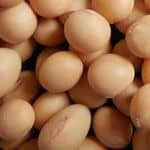 1. Dry Roasted Soybeans (Edamame) + Add
Edamame is one of the most balanced and nutrient dense foods around. High in protein, fats, carbs, and a range of electrolytes, edamame is a great choice to take with you on a hike. It is lightweight and cheap too, and makes for a great quick snack.
1. Dry Roasted Soybeans (Edamame) + Add
Edamame is one of the most balanced and nutrient dense foods around. High in protein, fats, carbs, and a range of electrolytes, edamame is a great choice to take with you on a hike. It is lightweight and cheap too, and makes for a great quick snack.
Nutrition Facts for Dry Roasted Soybeans (Mature Seeds). -
 2. Lentils + Add
Pink shelled lentils will cook in 10-20 minutes. Just add 2 parts water per cup of lentils and boil for 10-15 minutes. Lentils are very high in protein, carbs, fats, and fiber.
2. Lentils + Add
Pink shelled lentils will cook in 10-20 minutes. Just add 2 parts water per cup of lentils and boil for 10-15 minutes. Lentils are very high in protein, carbs, fats, and fiber.
Nutrition Facts for Cooked Lentils (Boiled) (Mature Seeds). -
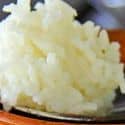 3. Rice + Add
Rice is a great healthy staple. It feeds over the half the world. Get par-boiled or precooked rice to save on cooking time. Adding vegetable based soup bouillon cubes can be a great way to add flavor and electrolytes. Just be sure to get lower sodium bouillon, without partially hydrogenated oils.
3. Rice + Add
Rice is a great healthy staple. It feeds over the half the world. Get par-boiled or precooked rice to save on cooking time. Adding vegetable based soup bouillon cubes can be a great way to add flavor and electrolytes. Just be sure to get lower sodium bouillon, without partially hydrogenated oils.
Nutrition Facts for Cooked White Rice. -
 4. Pasta + Add
Pasta is actually lighter than rice, and also cooks quickly. Like rice, adding soup bouillon cubes can be a great way to add flavor and electrolytes.
4. Pasta + Add
Pasta is actually lighter than rice, and also cooks quickly. Like rice, adding soup bouillon cubes can be a great way to add flavor and electrolytes.
Nutrition Facts for Cooked Whole Wheat Pasta. -
 5. Oatmeal + Add
Traditionally eaten for breakfast, oatmeal is a great source of fiber, and healthy carbs. Add nuts and dried fruits for an extra boost of energy to keep you going longer into the day.
5. Oatmeal + Add
Traditionally eaten for breakfast, oatmeal is a great source of fiber, and healthy carbs. Add nuts and dried fruits for an extra boost of energy to keep you going longer into the day.
Nutrition Facts for Cooked Oatmeal. -
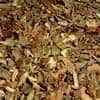 6. Dried Herbs or Vegetables + Add
Freeze dried herbs or vegetables make a great addition to rice, pasta, and lentils. Not only do they add flavor, they also add vitamins, minerals, and fiber.
6. Dried Herbs or Vegetables + Add
Freeze dried herbs or vegetables make a great addition to rice, pasta, and lentils. Not only do they add flavor, they also add vitamins, minerals, and fiber.
Nutrition Facts for Dried Oregano. -
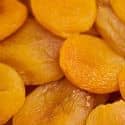 7. Dried Fruits + Add
While high in sugar, dried fruits are a great source of vitamins, minerals, carbs, and fiber. Be sure to brush your teeth or chew some dental gum after eating them to prevent dental problems down the road.
7. Dried Fruits + Add
While high in sugar, dried fruits are a great source of vitamins, minerals, carbs, and fiber. Be sure to brush your teeth or chew some dental gum after eating them to prevent dental problems down the road.
Nutrition Facts for Dried Apricots. -
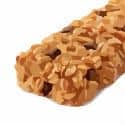 8. Cereal/Energy Bars + Add
For healthier choices in cereal/energy bars choose those low in added sugar and refined oils. Better yet, try making your own with superfoods like flax seeds, quinoa, and chia seeds.
8. Cereal/Energy Bars + Add
For healthier choices in cereal/energy bars choose those low in added sugar and refined oils. Better yet, try making your own with superfoods like flax seeds, quinoa, and chia seeds.
Nutrition Facts for Rice and Wheat cereal bar. -
 9. Nuts and Seeds + Add
Nuts and seeds are great source of healthy fats, protein, carbs, minerals, and fiber. That said, nuts need to be stored properly to last a long time. They are also not the lightest or cheapest of food choices.
9. Nuts and Seeds + Add
Nuts and seeds are great source of healthy fats, protein, carbs, minerals, and fiber. That said, nuts need to be stored properly to last a long time. They are also not the lightest or cheapest of food choices.
Nutrition Facts for Almonds. -
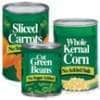 10. Canned Vegetables + Add
Canned foods are not light, but are cheap and convenient. They are also a good source of protein and vitamins. Be sure to find canned foods with little to no added sodium and/or sugar.
10. Canned Vegetables + Add
Canned foods are not light, but are cheap and convenient. They are also a good source of protein and vitamins. Be sure to find canned foods with little to no added sodium and/or sugar.
Nutrition Facts for Canned Green Beans.
Related
Simplify Nutrition Tracking with MyFoodData!
Speedy Tools and Detailed Data FREEEasily analyze your meals to find the best foods for your goals.
✅ Use our recipe nutrition calculator and nutrition comparison tool.
✅ Access expert nutrition data tools and in-depth articles.
✅ Log foods and organize your recipes with a free account.

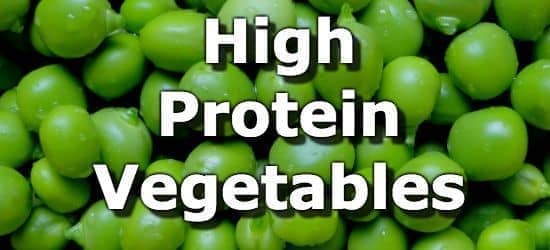 Next ➞
Next ➞
